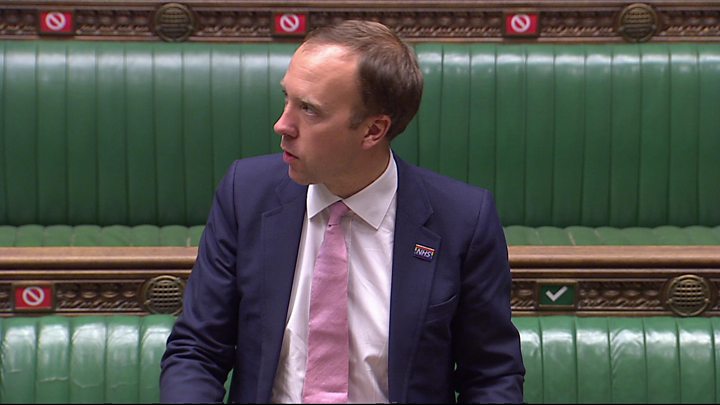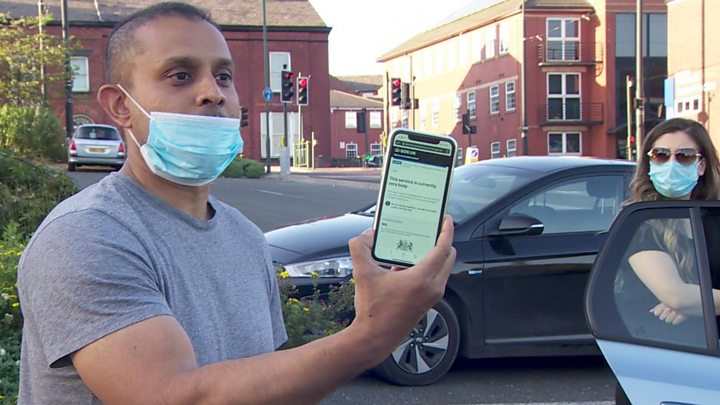 Image copyright
PA Media
Image copyright
PA Media
Plans to prioritise coronavirus tests and put NHS staff at the top of the list will be published in the coming days, the justice secretary has said.
People in care homes would also be a priority, while schools could also be considered, Robert Buckland said.
Resolving delays with testing was "the number one issue", he added.
It comes as the mayor of Greater Manchester - home to England's highest infection rate - said time was running out to fix the testing system.
"I think we have two or three weeks to fix these things," mayor Andy Burnham told the BBC's Newsnight programme. "If we don't, the worry is we'll never gain control as we head into autumn and winter."
Bolton NHS Trust in Greater Manchester said on Tuesday that around 100 people had turned up to accident and emergency asking for a test.
Mr Burnham called on the government to work with local authorities to establish where there are shortages and where capacity should be focused.
Speaking to BBC Breakfast, Mr Buckland said the government would "do whatever it takes to make sure we have that capacity" and there was a "big determination within government" to improve the system and minimise disruption.
He said testing centres would be increasing from about 400 to 500 in the next few weeks and the government was opening laboratories "across the country".
As well as prioritising tests for the NHS and social care, he said schools were also important because of its "knock-on effect to the working lives of parents and carers".
Health Secretary Matt Hancock will announce who will be prioritised for tests in the coming days.
Why are there delays?
A surge in demand for coronavirus tests has led to local shortages, with many people reporting problems securing online bookings and being directed to test sites hundreds of miles from home.
The large Lighthouse laboratories, run by the government to analyse test swabs from all the UK nations, have been under strain to process them all.
Test slots are limited because, while there seem to be enough testing sites, there are bottlenecks in labs for processing swabs, BBC health editor Hugh Pym said.
A new lab is due to be up and running but that could be a few weeks away - and until then ministers say current problems are likely to continue.
On Wednesday, Mr Buckland said 90% of tests done in person were being returned in a day but "there was much more work to do" to turn around home tests.

Media playback is unsupported on your device
Mr Hancock, speaking in the House of Commons on Tuesday, said rising demand for tests meant the government was "having to prioritise once again and I do not shirk from decisions about prioritisation".
Data on backlogs in labs is not publicly available, but Mr Hancock said it was "less than a day's capacity". That means it could be anywhere up to 244,000.
The Department of Health has said about a quarter of people requesting tests have no need to do so - and only those with relevant symptoms should book.
What problems are schools facing?
Some have closed their doors days after reopening while others have told classes and whole year groups - many of which form one bubble - to self-isolate for two weeks following confirmed cases.
Union leaders have called for the education sector to be prioritised for the allocation of tests.
Geoff Barton, general secretary of the Association of School and College Leaders (ASCL), said keeping schools open would become "unsustainable" if issues with testing capacity were not fixed.
He told BBC Radio 4's Today programme, head teachers would have to decide whether a bubble stays at home if a pupil or teacher in a year group showed Covid-19 symptoms and could not get a test to prove they were negative.
He said it would feel like lockdown "by default" - and be more frustrating for parents as it is unpredictable.
Dr Patrick Roach, general secretary of the NASUWT teaching union, said the delays in testing meant some students and staff who were part of a bubble within a school were not being isolated even where there were multiple suspected cases.
"This is putting at risk the health and safety of others within the school and within the local community," Dr Roach said in a letter to the schools minister.
The people struggling to get a test
Image copyright Scott Vining Image caption Cafe owners Scott Vining and his wife worry testing delays mean they will have to close their family businessScott Vining's daughter fell ill with a temperature on Saturday. By Sunday, the rest of the family, who live near Dunstable, in Bedfordshire, had also developed symptoms.
"We've tried hundreds of times," he told the BBC about trying to book a test. "We started to try and book tests for my daughter on Sunday, to no avail, and then we started at 08:00 on Monday morning for us all."
At one point Scott was offered a test in Warwickshire, 65 miles away from his home, through the government website. But by the time he'd entered the details of his family of four, the spaces had disappeared.

Media playback is unsupported on your device
Maria Aziz, from west London, has been trying to book a test since Sunday, when her nine-year-old daughter, Mishal, complained of a sore throat. By 04:00 Monday, her daughter had developed a fever.
She said she had spent three days trying and failing to book a test. Her eldest daughter, Eimann, 14, also had to be withdrawn from school while she tried to book a test for her younger daughter.
"I'm trying through the government website and then yesterday there was also a number on the website to call - 119 - so I tried that as well. Each time there were no tests available. No home kits. No walk-in slots. No drive-through slots. Nothing."
How many tests are being carried out?
Around 220,000 tests are processed each day, according to government figures for Monday.
The government said its UK laboratory daily testing capacity was more than 370,000 as of last week - which includes antibody tests and those tests used by scientists to estimate how widespread the virus is.
Testing capacity (excluding antibody tests and virus spread testing) is about 245,000 a day.
Government data shows that both testing capacity and laboratory capacity have increased considerably since the beginning of the pandemic, The aim is to increase capacity to 500,000 a day by the end of October.
However, there has been a sizeable gap between how many tests labs are able to process ("capacity") and the number of tests actually processed.
Analysis from Our World In Data, a research team based at the University of Oxford, suggests the UK is now performing more tests than many other countries.
For example, the seven-day average up until 10 September showed the UK had carried out 2.8 tests per 1,000 people. This was ahead of European countries including France (2.1) and Spain and Germany (both 1.8).
Have you had problems getting a coronavirus test? Share your experiences by emailing haveyoursay@bbc.co.uk.
Please include a contact number if you are willing to speak to a BBC journalist. You can also get in touch in the following ways:
WhatsApp: +44 7756 165803 Tweet: @BBC_HaveYourSay Please read our terms & conditions and privacy policy
 5 years ago
710
5 years ago
710 

